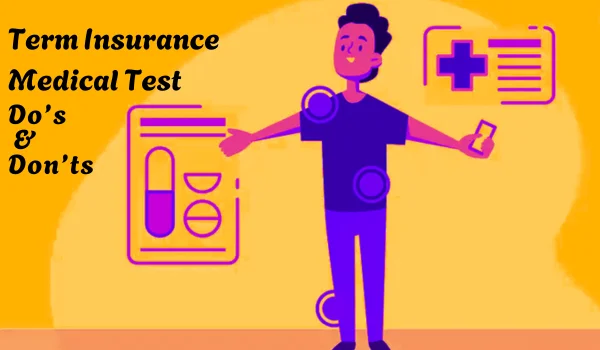In most cases, once you decide to acquire term life insurance, going through a medical test is an important part of the process. The tests allow insurers to gauge your health status and how much you would pay in terms of premiums for that particular cover. Preparations will enhance the likelihood of correct results, possibly quality premiums. So, let’s begin with some very important dos and don’ts that are going to guide you through this term insurance medical test.
Why Do Medical Tests for Term Insurance Have to Be Done?

Medical tests give a glimpse of your general health. The results help the insurance company to assess the risk of covering you. Based on your health metrics, they can:
- Determine Premium Rates: Healthier people often have lower premiums.
- Verify Information: The test checks information about your health as indicated in the application.
- Set Coverage Terms: Depending on your health, the insurance company sets coverage terms and conditions.
Now that you have known the importance of these tests, let’s get started and find out how you can prepare for them.
Do’s: Tips to Ace Your Medical Test
Good Sleep Is a Must: With ample sleep, you keep your blood pressure and heart rate in control. So make sure to sleep for 7-8 hours the night before the test. Deprivation of sleep will have your stress levels flying high and may tilt the results.
Fast if Necessary: Most medical tests with term life insurance require an 8-12-hour fasting period before the test. This is necessary to be able to get the most accurate readings for blood sugar and cholesterol. Check that fasting instructions from the insurer are followed.
Hydrate in the days leading up to the test: Drink plenty of water to make blood draws easier for technicians and to increase the accuracy of urine tests. However, do not overdo it on the day before the test, as increased fluid intake may dilute urine samples.
Eat Light the Day Before: To avoid elevated cholesterol or blood sugar readings, stick to a light and balanced diet 24 hours before your test. Opt for fruits, vegetables, whole grains, and lean proteins while avoiding greasy, sugary, or processed foods.
Bring Necessary Documentation: Carry identification and any paperwork the insurer has provided. If you’re on medication, bring a list of the prescriptions, as the examiner may ask about them.
Relax and Stay Calm: Your state of mind affects your physical state. Elevated anxiety can lead to higher blood pressure or irregular pulse rates. Practice deep breathing exercises to stay calm before and during the test.
Follow Medication Guidelines: If you’re on regular medication, follow your doctor’s advice regarding whether to take it before the test. Skipping medication without guidance can lead to misleading results.
Plan Smarly: Book an appointment in the morning. Then, your body will have sufficient rest and nighttime fasting is quite manageable.
The Don’ts: Mistakes to Avoid
Avoid Alcohol and Tobacco: Avert alcohol and tobacco for at least 24 hours before a test. Alcohol will influence your liver function readouts, while tobacco elevates blood pressure and heart rate-affecting how your test readouts would go.
Avoid Intensive Exercises: Generally speaking, exercise is a good thing; however, intense exercise shortly before your test may raise a heart rate or muscle enzyme level. So also do light exercises.
Do not withhold medical history: Be frank about your history and habits. Hiding may make your application not tally the results of your test, hence jeopardizing your insurance approval.
Do not overcaffeinate: Caffeine raises your blood pressure and heart rate. Avoid coffee, tea, or energy drinks for at least 12 hours before your test.
Avoid Stressful Activities: Stress increases cortisol levels and blood pressure. Plan your day to minimize stress, avoiding arguments, tight schedules, or challenging tasks before the test.
Don’t Try to Cheat the Test: Some people mistakenly believe that temporary measures like crash dieting or taking unprescribed medications can manipulate test results. This approach is risky and often counterproductive, leading to false readings or additional tests.
What to Expect During the Test
Medical test for term insurance is straightforward and carried out by professionals. Here’s a quick overview:
- Vitals Check: This checks for blood pressure, heart rate, and weight measurement.
- Blood Test: Cholesterol, blood sugar, and more will be checked.
- Urine Test: Evaluation of kidney functioning and substance abuse
- ECG (if applicable): Checking on the heart status in elderly people or people who have had issues related to their heart in the past
In general, all these processes should take less than 30 minutes. Preparations will leave you feeling very confident and give you a peaceful experience.
After Test Consideration:
- Resume all normal activities: Once the test is over, you can eat, drink, and resume your normal activities.
- Follow up: In case the insurance company asks for more tests, do not get alarmed. It is quite a common follow-up procedure that throws light on the anomalies of the initial results.
- Get information: Ask your insurance company or the medical examiner as to how to get your test results.
Innovative Insights: The Future of Medical Tests for Term Insurance
Some insurers now include simplified processes into their policies and allow at-home medical tests, or even forego the entire process for specified age groups or coverage amounts. Integration of Digital Health Data is coming and eventually wearables or apps will replace a more conventional medical exam. If you keep up with these changes, you are in a better position to get the easiest and most relevant policy.
Conclusion:
There are many ways you can prepare for a term insurance medical test without being anxious. These do’s and don’ts will get you prepared and thus confident in the process, with a good chance at positive outcomes. Remember that it is also important to be honest about the health insights that are being given, so the premium can be just, and coverage strong.
Invest in term life insurance and be assured of securing your family’s financial future. A little preparation today can go a long way in safeguarding tomorrow. Be well-informed and ask your insurer or medical examiner questions, too. To health and to security!
Hina Abbasi is Editor and a passionate sports and entertainment content writer at WinnersMaze.com. Hina’s expertise spans across a wide range of sports, and interest in many TV shows allowing her to deliver insightful analysis and compelling stories that resonate with readers.

